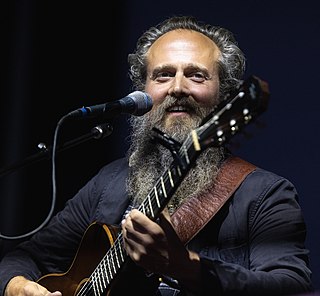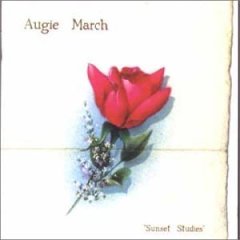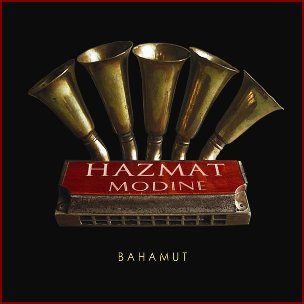
Math rock is a style of alternative and indie rock with roots in bands such as King Crimson and Rush. It is characterized by complex, atypical rhythmic structures, counterpoint, odd time signatures, and extended chords. It bears similarities to post-rock.

Samuel Ervin Beam, better known by his stage name Iron & Wine, is an American singer-songwriter. He has released six studio albums, several EPs and singles, as well as a few download-only releases, which include a live album. He occasionally tours with a full band.

The Argument is the sixth and final studio album from the post-hardcore band Fugazi released on October 16, 2001, through Dischord Records. It was recorded at Don Zientara's Inner Ear Studios in Arlington, VA and the Dischord House between January and April 2001. It was the band's last release before going on hiatus in 2003, until the release of First Demo over thirteen years later.

Little Birdy was an Australian alternative rock band formed in Perth, Western Australia, in 2002 by singer and guitarist Katy Steele, drummer Matt Chequer, guitarist and keyboardist Simon Leach, and bass guitarist Scott O'Donoghue. They gained public attention when their single "Relapse" gained popularity on alternative radio stations such as Triple J, leading them to be signed by the record label Eleven: A Music Company. They released three studio albums, two EPs, and ten singles.

You Am I are an Australian power pop band, fronted by its lead singer-songwriter and guitarist, Tim Rogers. They formed in December 1989 and are the first Australian band to have released three successive albums that have each debuted at the number-one position on the ARIA Albums Chart: Hi Fi Way, Hourly, Daily and #4 Record. Nine of their tracks appeared on the related ARIA Singles Chart top 50 with "What I Don't Know 'bout You", their highest charting, at No. 28. You Am I have received ten ARIA Music Awards from thirty-one nominations. The band have supported international artists such as the Who, the Rolling Stones, Sonic Youth and Oasis.

Life on Other Planets is the fourth album by English alternative rock band Supergrass. It is the first album that includes Rob Coombes as an official member of the band, and originally went under the working title of Get Lost. The American edition of the album included many bonus tracks and rare live editions. One of these live editions became infamous when it was discovered you can hear a gunshot in the background of the song. It peaked at #9 in the UK charts.

Augie March are an Australian pop and indie rock band formed in 1996 in Shepparton, Victoria. Since 2001 the group consists of vocalist and rhythm guitarist Glenn Richards, lead guitarist Adam Donovan, bass guitarist Edmondo Ammendola, drummer David Williams, and keyboardist Kiernan Box. Box had replaced Robert Dawson, the band's piano player since March 2000, who died in January 2001.

Andrew Wegman Bird is an American indie rock multi-instrumentalist, singer, and songwriter. Since 1996, he has released 16 studio albums, as well as several live albums and EPs, spanning various genres including swing music, indie rock, and folk music. He is primarily known for his unique style of violin playing, accompanied by loop and effect pedals, whistling, and voice. In the 1990s, he sang and played violin in several jazz ensembles, including Squirrel Nut Zippers and Kevin O'Donnell's Quality Six. He went on to start his own swing ensemble, Andrew Bird's Bowl of Fire, which released three albums between 1998 and 2001. Weather Systems (2003) was his first solo album after Bowl of Fire disbandment, and it marked a departure from jazz music into indie music. Bird's 2019 album My Finest Work Yet was nominated for "Best Folk Album" at the 2020 Grammy Awards.

Young Modern is the fifth and final studio album by Australian alternative rock band Silverchair, released in Australia on 31 March 2007 and in the United States on 24 July 2007 and co-produced by Daniel Johns and Nick Launay. The title comes from a nickname given to Daniel Johns by composer Van Dyke Parks. The tracks "Straight Lines", "Reflections of a Sound", "If You Keep Losing Sleep" and "Mind Reader" were released as singles. Young Modern entered the Australian albums chart at No. 1 on 15 April 2007, their fifth consecutive album to do this, making Silverchair the first band to accomplish this feat in Australia. The album was certified Triple Platinum by the ARIA, peaked at No. 70 on the US Billboard 200 chart and opened at No. 8 on the New Zealand albums chart. Young Modern won six ARIA Awards in 2007, including Best Group, Best Rock Album, Single of the Year and Album of the Year. At the J Awards of 2007, the album was nominated for Australian Album of the Year.

Moo, You Bloody Choir is the third studio album by the Australian indie rock band Augie March. It was released in 2006 in Australia by BMG. It entered the ARIA album charts at #10 and was nominated for Album of the Year at the ARIA Music Awards of 2006, losing to Tea & Sympathy by Bernard Fanning.

Sunset Studies is the debut studio album by the Australian indie rock band Augie March. It was released in October 2000 in Australia by BMG.

"One Crowded Hour" is a song by Australian indie rock band Augie March written by Glenn Richards. The song was released in April 2006 as the first single released from their third studio album, Moo, You Bloody Choir.
"Little Wonder" is a song by Australian rock band Augie March. The song was released as the second and final single from their second studio album Strange Bird. The peaked at number 75 on the ARIA Charts.
Andrew Bird's Bowl of Fire was an American band fronted by musician Andrew Bird. After releasing his first solo album, Music of Hair, Bird appeared on three albums by Squirrel Nut Zippers before becoming the bandleader for Andrew Bird's Bowl of Fire.
"The Cold Acre" is a song by Australian band Augie March. It was released in 2006 as the second and final single from the band's third studio album, Moo, You Bloody Choir.

Raise is the debut studio album by English alternative rock band Swervedriver. It was released on 30 September 1991 by Creation Records. The album contained six new songs; "Son of Mustang Ford", "Rave Down" and "Sandblasted" had all appeared on earlier EPs and singles released by the band between 1990 and 1991. The album received very positive reviews.

Watch Me Disappear is the fourth studio album from Australian indie rock group Augie March. The album was released on 10 October 2008. The album's title track was made available for download on the band's website on 26 August 2008. Augie March recorded Watch Me Disappear at Neil Finn's Auckland studios with producer Joe Chiccarelli. They also recorded in Melbourne, Sydney, and Los Angeles. The first single, "Pennywhistle", was released digitally on 16 September and physically on 27 September. Watch Me Disappear reached number four on the ARIA Albums Chart.

Bahamut is the debut album by American blues/folk/world music/jazz band Hazmat Modine. The album was released on August 26, 2006 by Barbès Records. Most tracks were composed by lead singer Wade Schuman; the album also includes arrangements of traditional songs. Tuvan folk band Huun-Huur-Tu feature on three tracks with their characteristic throat singing.
"Peeled Apples" is a song by Welsh alternative rock band Manic Street Preachers. It is the opening track of the band's ninth studio album, Journal for Plague Lovers. Produced by Steve Albini, the song, along with the other tracks of the album, features posthumous lyrics by Richey Edwards, who disappeared on 1 February 1995, and was declared legally dead in 2008.

"No More Looking Back" is the penultimate track on The Kinks' 1975 concept album, Schoolboys in Disgrace. Like all of the other tracks on the album, it was written by Ray Davies.















